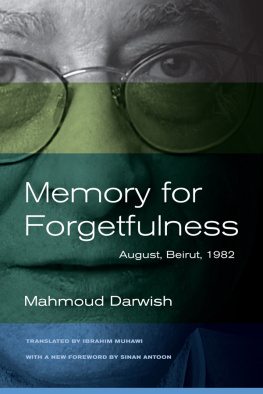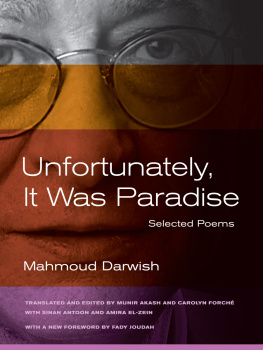
English translation copyright 2011 Sinan Antoon
Copyright Mahmoud Darwish/Actes Sud First published as F arat al-Ghiyb
by Riad al-Rayyes Books Ltd
First Archipelago Books Edition, 2011
All rights reserved. No part of this book may be reproduced or transmitted in any form without the prior written permission of the publisher.
Archipelago Books
232 3rd Street #A111
Brooklyn, NY 11215
www.archipelagobooks.org
Library of Congress Cataloging-in-Publication Data
Darwish, Mahmud
[Fi hadrat al-ghiyab. English]
In the presence of absence / Mahmoud Darwish ; translated by Sinan Antoon.
1st Archipelago Books ed.
p. cm.
Essays.
ISBN 978-1-935744-65-8
I. Antun, Sinan, 1967 II. Title.
PJ7820.A7F513 2011
892.7'46dc232011016473
Distributed by Consortium Book Sales and Distribution
www.cbsd.com
Cover photograph: Makbula Nassar
[The remains of the destroyed cemetery in al-Birwa, Palestine]
The publication of In the Presence of Absence was made possible with support from Lannan Foundation, the National Endowment for the Arts, and the New York State Council on the Arts, a state agency.

CONTENTS
In the Presence of Absence (F arat al-Ghiyb) was published in the original Arabic in 2006. As with every work Darwish published in the last four decades, its appearance in the Arab world was an event. Darwish was the most popular and prominent Arab poet and had become a major world poet. With every new work, he surprised his readers and entered another phase in his ongoing birth, as he called it. This work was designated in its subtitle as a text. It was neither a collection of poems, nor an ordinary work of prose. The books title and cover already welcomed the reader into the space Darwish was creating. A space where presence and absence, prose and poetry, and many other opposites converse and converge. He was at the apex of his genius and creativity, but with the knowledge that his death might be imminent. (He died two years later, on August 9, 2008). Thinking this might be his final work, he summoned all his poetic genius to create a luminous text that defies categorization. Twice before Darwish had experienced brushes with death due to heart problems, and wrote about defying death in his epic poem, Mural. Now it was time to bid himself farewell, before others do, and write his self-elegy. The books cover itself mimics a tombstone, if we read the authors name and the title as one sentence: Mahmoud Darwish, in the presence of absence. But it is a tombstone promising an eternal presence in words.
Self-elegy is an established genre in classical Arabic poetry, with roots going back to pre-Islamic times. In Darwishs hands, this kernel is introduced to new ground and branches out toward new horizons. The living I bids farewell to its imagined dying other in a sustained poetic address divided into twenty untitled sections. Each section, however, is a self-contained unit and addresses a theme or a phase in the authors past. On the threshold of immortality, the poet reflects on his own existence, intertwined with that of his exiled people through both historical narrative and material reality.
Although there is obviously an autobiographical dimension to the work, it should not be reduced to that. Perhaps poetography would be more appropriate, even if it fails, just as any single category would, in fully framing the text.
Why poetography? Because in this text, as in his life, Darwish was a poet first and foremost. His being and desire were devoted to writing poetry. A major thread throughout the text recalls the genesis and maturation of a poet and a life in and for poetry. He was born twice, first as others are, but the second time as a poet. The text traces the young childs initial encounter and fascination with language and the magic of words, the raw material out of which he would later construct a metaphorical homeland for his people. Before the poet was born in the boy, however, he was exiled from Palestine, together with his family, and became a refugee in Lebanon. He later returned to live in his own homeland as a present absentee, his designation by the state of Israel. It is a poetography of the poet who was destined to become a Trojan poet, who reminded the world that it had yet to hear the voice of the Trojans: Homer is the glorious song of the Greeks. There is no doubt that the Trojans would have expressed things differently, but their voice was forever lost. I, as poet, am in search of those voices. His poetry and politics took him to prison and house arrest and, later, to various exiles, where he witnessed the tragic chapters in the collective history of his people and voiced their will to live, love, and be. Much of his poetry was and is the intertwining of history and mythology and the intersection or fusion of the individual with the collective.
But the Trojan poet was equally determined to be the poet he imagined himself to be, and to protect and preserve the aesthetics of his project. But to be the poet of a people and a homeland par excellence, while somehow allowing ones poetry to remain free of the political demands and immense expectations to write ones own poetry was a daunting task and would have been debilitating for most poets. With stubbornness and a restless creative spirit, Darwish succeeded in this and continued to transcend and reinvent himself, becoming a great world poet.
Some of the sections of the text look back at the poets private space and his intimate and daily habits, but even these are centered around the beauty of words and language. His day is structured around the act of writing and dedicated to the search for the next poem. Even the mundane and the ephemeral are elevated here when they are seen through the poetic eye. The sublime and universal, such as love and longing, occupy the poet as well, and invite his interrogative and philosophical reflections. The eternal exile and incessant traveler makes sure to revisit his favorite cities. He praises exile for its gifts before bidding it farewell to return. But where to? What remains of the poets village in the Galilee are remnants, left in a country still founded on his absence and erasure. He needs a special permit to visit his family for a few days. In Palestine he stands before his own absence and looks at a life interrupted.
It is a poetography because it is not only a final look back at the poetics of life from a rare space where opposites bleed and blend into each other: life and death, home and exile, but also, and most important, poetry and prose. When asked about In the Presence of Absence, Darwish said, I was searching for another form for writing. This text is the convergence of two genres: prose and poetry.
Blocks of poetry, written in meter and with rhyme, were set apart from the rest of the Arabic text in the original. I have kept this distinction in the translation. The rest of the text, while not in metered poetry, pulsates with syntactic rhythms and frequently includes internal rhyme. Although not without effort, I have tried, whenever possible, to render this in translation.
Darwish stressed that his main concern in this work was to give the beauty of Arabic prose its maximum potential... I was interested in celebrating language and making it dance, as if I were working in a festival of words, images, and aesthetics, liberated from any other consideration. I wanted to free the demons, doves, and birds of Arabic.
It is challenging to attempt to translocate this celebration to another language, but it had to be done. It is one of the most beautiful books I have read in Arabic.
Next page










